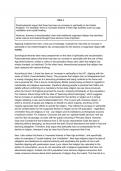Essay
Year 13 Sociology Beliefs in Society Essay (Grade A)
- Course
- Institution
Item J: Postmodernists argue that there has been an increase in spirituality in the United Kingdom. For example, there is increased interest in New Age activities such as yoga, meditation and crystal healing. However, theories of secularisation claim that traditional organised religion has decli...
[Show more]



